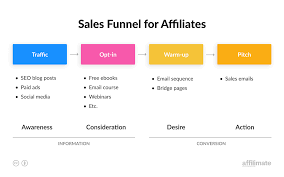What’s an Affiliate Marketing Funnel (A Comprehensive Guide)
In today’s digital landscape, where online businesses are booming and e-commerce is thriving, affiliate marketing has emerged as a powerful strategy for both advertisers and publishers.
But what exactly is an affiliate marketing funnel, and how does it work? In this blog post, we will delve into the world of affiliate marketing and explore the concept of the affiliate marketing funnel.
We’ll uncover its purpose, its components, and how it can be optimized to drive conversions and generate revenue. Whether you’re new to the concept or looking to enhance your existing affiliate marketing efforts, this guide will provide you with the knowledge and insights you need to succeed in the competitive world of affiliate marketing.
About Affiliate Marketing Funnels
An affiliate marketing funnel is a strategic process that helps affiliates promote products or services and earn commissions for each sale made through their referral. The funnel typically consists of multiple stages, starting with attracting potential customers to a specific landing page or website.
Once the visitors are on the site, they are enticed to provide their contact information in exchange for valuable content or engaging offers. This allows the affiliate to build a list of leads and establish trust with them over time.
The next stage involves nurturing these leads by providing them with relevant and helpful information related to the product or service being promoted. This can be done through email marketing campaigns, blog posts, social media interactions, or webinars. By consistently delivering value and building rapport with the leads, affiliates increase their chances of converting them into paying customers.
The final stage of the affiliate marketing funnel is closing the sale. At this point, affiliates leverage persuasive sales tactics such as limited-time offers, discounts, bonuses, or testimonials to encourage prospects to make a purchase. Once a sale is made through an affiliate’s referral link or unique tracking code, they receive a commission from the merchant as compensation for their efforts in driving sales.
Understanding the concept of a funnel
An affiliate marketing funnel is a strategic process that enables affiliates to attract potential customers and guide them through various stages until they make a purchase. This concept revolves around the idea of converting website visitors into paying customers by nurturing their interest and building trust in the product or service being promoted. The main goal of an affiliate marketing funnel is to optimize conversions and maximize revenue for both the affiliate marketer and the merchant.
The first stage of an affiliate marketing funnel is usually awareness, where affiliates create compelling content or advertising campaigns to capture the attention of their target audience. This may involve utilizing social media platforms, search engine optimization techniques, or paid advertisements. Once visitors are directed to the affiliate’s website, they enter the consideration stage, where they are provided with more detailed information about the product or service being promoted. Affiliates often leverage persuasive copywriting techniques, customer testimonials, and engaging visuals to showcase the benefits and value proposition of what they are promoting.
Moving further down the funnel is the decision stage, where potential customers are encouraged to take action by making a purchase. Affiliates may offer exclusive discounts, limited-time offers, or bonuses as incentives to increase conversions at this crucial point in the funnel. Additionally, integrating effective call-to-action buttons or forms can facilitate a seamless transition from consideration to conversion. By understanding and implementing an affiliate marketing funnel effectively, affiliates can greatly enhance their chances of success in generating sales and earning commissions from their promotional efforts.
You May Also Like: Best Funnel Builder for Affiliate Marketing
The different stages of an affiliate marketing funnel
An affiliate marketing funnel is a step-by-step process that guides potential customers from the initial point of contact to making a purchase. It consists of various stages, each with its own purpose and goal. The first stage is awareness, where the marketer aims to attract the attention of potential customers by creating compelling content or advertising campaigns. This stage focuses on building brand recognition and generating interest.
The next stage is consideration, where the potential customer becomes more interested in the product or service being promoted. Marketers typically offer valuable information, reviews, or comparisons to help prospects make informed decisions. At this stage, it’s essential to establish trust and credibility.
The final stage is conversion, where the potential customer takes action and makes a purchase. Marketers often use persuasive techniques such as limited-time offers or discounts to encourage conversions. They may also provide additional incentives like bonuses or freebies to sweeten the deal and increase conversions rates. The goal of this stage is to turn leads into paying customers while maximizing revenue for both the marketer and affiliate partner.
How to create an effective affiliate marketing funnel
An affiliate marketing funnel is a strategic process that affiliates use to guide potential customers from awareness of a product or service to make a purchase.
The funnel typically consists of multiple stages, each designed to nurture the prospect and move them closer to becoming a paying customer.
Starting with generating traffic, the goal is to capture leads through email sign-ups or other means, then nurture those leads by providing valuable content and building trust. Finally, the funnel aims to convert those leads into sales through personalized offers and effective call-to-action.
To create an effective affiliate marketing funnel, it’s crucial to understand your target audience’s needs and pain points. This allows you to tailor your content and promotional strategies accordingly. Begin by attracting targeted traffic through various channels such as search engine optimization (SEO), social media advertising, or content marketing. Once you have their attention, offer valuable lead magnets like free e-books or webinars in exchange for their contact information. Then, use email marketing sequences and automated nurturing campaigns to build relationships with your leads over time.
Furthermore, it’s important not only to focus on promoting products but also on providing value-added content that educates users about their problems and offers solutions. Incorporate testimonials or case studies into your promotions where possible as these can significantly improve conversion rates. Lastly, continuously analyze data from each stage of the funnel using tools like Google Analytics or heat-mapping software to identify areas for improvement and optimize conversions along the way.
Strategies to drive traffic into your funnel
An affiliate marketing funnel is a step-by-step process that allows affiliates to attract potential customers, nurture them, and ultimately convert them into paying customers. To drive traffic into your funnel effectively, one strategy is to optimize your website for search engines. By conducting keyword research and incorporating relevant keywords in your website’s content and meta tags, you can improve your search engine rankings and increase organic traffic.
Another effective strategy is to utilize social media platforms. By creating compelling content and engaging with your target audience on platforms like Facebook, Instagram, or Twitter, you can drive traffic to your affiliate marketing funnel. You can also consider running paid advertising campaigns on these platforms to reach a wider audience and generate more leads.
Additionally, leveraging email marketing can be highly beneficial in driving traffic into your funnel. By building an email list of subscribers interested in your niche or products/services you promote as an affiliate marketer, you can send targeted emails containing valuable content and offers that direct recipients toward your funnel.
Overall, combining these strategies along with other proven techniques such as guest blogging or influencer collaborations will help maximize the flow of traffic into your affiliate marketing funnel.
Converting leads into sales with your funnel
An affiliate marketing funnel is a strategic process that helps convert leads into sales for affiliates. It involves a series of steps or stages designed to guide potential customers through the purchasing journey. The funnel typically begins with attracting leads through various marketing channels, such as social media, email marketing, or search engine optimization.
Once leads are generated, the next step is to engage and nurture them by providing valuable content and building trust. This can be accomplished through personalized emails, webinars, or exclusive offers. The goal is to establish a relationship with the lead and position yourself as an authority in your niche.
As the lead progresses through the funnel, they are presented with compelling offers and incentives to encourage them to make a purchase. These can include limited-time discounts, bonuses, or access to exclusive products. By strategically guiding leads through each stage of the funnel, affiliates can effectively convert them into paying customers and generate revenue for themselves and the product owner.
Conclusion: Maximizing success with your affiliate marketing funnel.
An affiliate marketing funnel is a step-by-step process that helps guide potential customers through the buying journey, ultimately leading to a conversion. It involves various stages such as awareness, interest, decision-making, and action. The goal of an affiliate marketing funnel is to attract qualified leads and nurture them until they are ready to make a purchase. By strategically optimizing each stage of the funnel, marketers can maximize their success with affiliate marketing.




